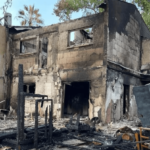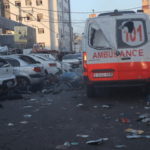In a tragic escalation of violence in the Gaza Strip, Israeli airstrikes have claimed the lives of at least twenty Palestinian journalists, marking one of the deadliest days for local reporters since the onset of the military’s bombing campaign nearly three weeks ago. The international community is increasingly alarmed as Big Tech platforms, in coordination with Tel Aviv, play a role in muzzling Palestinian media outlets, raising concerns about the suppression of voices critical of Israeli actions.
On October 25, Israeli strikes targeted Gaza, resulting in the deaths of three Palestinian journalists. Heartbreaking scenes unfolded throughout the day, with footage capturing the moment Ramallah-based journalist Mohammed Farra received the devastating news that his wife and children had been killed in an Israeli airstrike in Gaza’s Khan Younes neighborhood. Similarly, Al Jazeera Arabic’s Gaza bureau chief, Wael Dahdouh, lost his wife, son, daughter, and infant grandson in another Israeli airstrike.
The suspicion that Israeli forces deliberately targeted Dahdouh’s family gained traction following comments from News 13 journalist Zvi Yehezkeli, who said: “Generally we know the target. for example, today there was a target: the family of an Al Jazeera reporter. In general, we know.”
This incident adds to a troubling pattern, considering that in 2021, the Israeli military leveled a Gaza tower housing reporters from the Associated Press and Al Jazeera.
The international community’s concerns intensify as the United States, under Secretary of State Antony Blinken, is seen working to suppress Al Jazeera’s coverage of the conflict. Blinken reportedly urged Qatar, where Al Jazeera is based, to tone down its rhetoric about the war in Gaza during a recent visit. The Biden administration’s alignment with such efforts raises questions about the protection of press freedom and the role of the US government in influencing media coverage.
Big Tech Censors Palestinian Journalists
In the aftermath of the October 7 events, Big Tech platforms have become crucial players in Israel’s propaganda war. Numerous social media profiles belonging to prominent journalists, human rights advocates, and Palestinian activists have been suspended or deactivated. The sweeping crackdown on these accounts has raised concerns about the impartiality of content moderation policies, with allegations of double standards in addressing anti-Zionist content on social media.
One notable case is the disappearance of accounts operated by Eye On Palestine from Instagram, Facebook, and X on October 25. With over 6 million followers, this resource provided firsthand footage of the destruction in Gaza. Meta, the parent company of Instagram and Facebook, denied any political motivation behind the suspensions, asserting that they did not disable these accounts because of the content they were sharing. However, Meta’s history of complying with Israeli government censorship requests casts doubt on these assurances.
The censorship extends beyond suspensions to the outright deletion of profiles, as seen in the case of Palestinian journalist Tamer Al Mishal. His exposé on how Meta coordinated with Israeli intelligence to stifle pro-Palestinian content resulted in the complete disappearance of his Facebook page. This incident, along with the suspension of the Instagram account of Palestinian influencer and photojournalist Motaz Azaiza, highlights the challenges faced by Palestinian journalists in navigating not only the Israeli occupation but also social media censorship.
Shadi Abdelrahman, a local reporter with extensive experience covering events in Gaza, emphasized the difficulty faced by journalists working in the region, stating: “those journalists who were attending the weekly marches and covering it were targeted deliberately by Israel.
“Some of them were shot in the knees, some of them were shot in the legs. Some of them got killed.”
Beyond the challenges posed by Israeli authorities, social media censorship adds another layer of complexity. Journalists need to tread carefully on social media platforms, as outspoken coverage can lead to account bans. Abdelrahman highlighted the deliberate targeting of journalists during the Great March of Return in 2021, where some were shot or killed while covering events.
Moreover, reports on Instagram suggest a ‘glitch’ that temporarily translated the Arabic word for “Palestinian” into “Palestinian terrorist.” This incident further raises concerns about biased algorithms and the potential impact on the portrayal of Palestinians on social media platforms.
As the Israeli military’s actions continue to draw international scrutiny, the role of Big Tech in shaping the narrative and stifling dissent is becoming increasingly evident. The collaboration between tech platforms and governments in suppressing voices critical of Israeli actions highlights the broader implications for press freedom and the ability of marginalized communities to share their stories.
Akashic Times is the UK’s only online, fully independent not-for-profit newspaper that brings you real news from across the globe.
If you want to keep ahead of what is really going on in the world, subscribe to our newspaper via the subscribe button and join our Facebook & Twitter pages. Subscription is completely free ofcourse


















Follow Us!